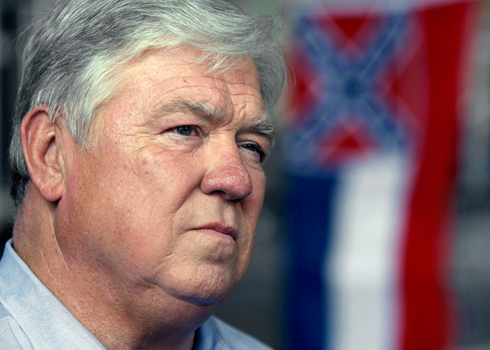Mississippi Gov. Haley Barbour (R), when defending the Citizens Council in his hometown of Yazoo City, painted himself as oblivious to politics and the civil rights movement as a teenager. When Martin Luther King Jr. came to town, he said, he and his friends paid more attention to the girls than the reverend.
But Barbour’s older brother, Jeppie Barbour, was very aware of politics and the civil rights movement, as he was mayor for several years starting in 1968. As the Weekly Standard profile noted, that meant Jeppie Barbour was in office during the court-ordered but extremely peaceful integration of the city’s schools, an integration the elder Barbour saw as inevitable.
It was a question about that non-violent integration that prompted Haley Barbour’s controversial comments, as he credited the segregationist Citizens Councils for that peacefulness. Barbour today issued a statement backing up a bit, saying it was the town leadership that kept integration peaceful but that “their vehicle, called the ‘Citizens Council,’ is totally indefensible.”
While mayor, Jeppie Barbour became a central figure in reporter Willie Morris’ 1971 book about the integration of Yazoo City. The book largely portrayed Barbour as a relative moderate on race.
But during one interview for the book, Barbour told Morris that he was having trouble working with the town’s biracial commission, complaining that whites could no longer appoint black commissioners of their choosing. From the book, as quoted at length by HuffPo’s Amanda Terkel:
“Maybe five years ago,” he said, “you could’ve appointed a colored man yourself. Now you simply can’t get away with it. They’re goin’ to have to pick their own leaders. You could’ve gotten on radio five years ago using these very words, ‘George Collins is this ni**er we’ve appointed,’ and could’ve gotten away with it. I guess they’re just goin’ through a state of being rebellious and hard-nosed and not listenin’ to white people like they used to.”
He also complained about a black boycott of white businesses — a tactic the Citizens Council was known to use, albeit in reverse.
We were having some fish for lunch in the back room at Danrie’s, and Jeppie complained about the Negro boycott. “South Main Street’s dryin’ up,” he said, and listed the stores that had gone out of business, including one drugstore hit hardest “because it specialized in chitlin’ sandwiches and two-dollar pistols.” The Negro leaders in charge now “are completely irresponsible. They’re determined to destroy the whites economically. That’s totally unreasonable. Unfortunately they’ve got the support of the colored community now.”
He also noted the usefulness of pepper spray when dealing with public drunkenness:
The town has seventeen policeman in all, which struck me as a substantial force for a town of 14,000, and Mace is standard equipment; the policemen carry it on their belts. “You get a drunk,” Jeppie says; “you either get him to come with you or you have to manhandle him. You give him Mace and he’ll want to go anywhere with you. It keeps that ni**er’s head in good shape.”
Late update: A reader notes that Jeppie Barbour is now working on the Mississippi gubernatorial campaign of Republican Dave Dennis as the campaign’s field director.






